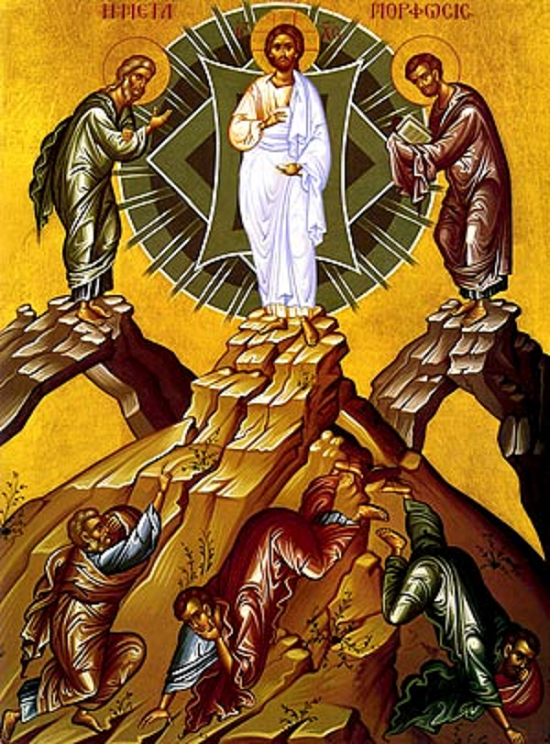Beyond the Bible
Second Sunday of Lent Scripture Readings

The story of the Transfiguration has only one purpose in the gospels, and that is to bring home to those who hear it a testimony to the identity of Jesus. It’s important to note the rich symbolism that pervades it whenever we encounter this gospel story. No matter how familiar these elements may be to us, they bear repeating. Here are some of them. Jesus is seen as the new Moses as he “climbs a high mountain.” However, this time, he doesn’t go it alone but takes with him Peter, James, and John, his three closest disciples. We sense echoes of Moses climbing Mount Sinai to encounter the God of his fathers, Abraham, Isaac, and Jacob. It’s there where God reveals to humankind his intimate, personal name, Yahweh, and therefore his nature and essence: “I am who am,” or “I cause to be all that is.” Jesus, likewise, is transfigured before his disciples, revealing his true nature. We’ll never be sure exactly what that looked like to the disciples, but rest assured, it was life-changing. It was, after all, their first glimpse of what it actually meant to be the Messiah.
The dazzling white clothes that they saw on Jesus were a clear sign to them that they were in the presence of divinity. It hearkened back again to Moses whose face shone so brightly after he’d come down from the mountain that he had to wear a veil over it when he appeared before the people. Not only that, but we hear of a cloud overshadowing them on the mountain just as the cloud had descended upon Mount Sinai when Moses stood before God. The same cloud that signaled the presence of God descended upon the Ark of the Covenant in the meeting tent as the Israelites wandered in the desert, and again in the Holy of Holies of Solomon’s temple. The Book of Exodus [33:11] speaks of God conversing with Moses “face to face as a man speaks to his friend.” Now, in the gospel, the voice of the Father speaks not only to Jesus but also to his disciples. God doesn’t give them commandments carved into tablets of stone. Instead, he shows them his Son and commands them to listen to him. All the trappings of Jewish religious life up until that moment were superseded. God no longer presents himself on a mountain or in a temple. He’s no longer solely to be found with the Ark of the Covenant containing the tablets of the law. God now dwells among his people in the person of Jesus.
There’s always a lesson that we can take away from our Scripture readings. Today’s can be found if we meditate on the realization that came upon the disciples that day. They saw Moses and Elijah conversing with Jesus. Moses, the lawgiver, was the symbol of the Torah—the Law of Moses. Elijah was the greatest of prophets who was promised to return as the herald of the Messiah. As such, he was the symbol of the Prophets. The Law and the Prophets—what we now call the Hebrew Bible—testified to the coming of Jesus, the Messiah savior king. The voice that came from the cloud interrupted their conversation. What did it say but, “This is my beloved Son. Listen to him.” I repeat: “Listen to him.” When the disciples looked up, Moses and Elijah—the Law and the Prophets—were gone and there was only Jesus.
The meaning hidden in this seemingly simple text is, nonetheless, profound. In fact, it’s so profound that many Christians throughout the ages and even down to today have missed it. There’s no doubt that the Hebrew Bible—the Law and the Prophets—contains the words of God. We rightly revere it for that reason. However, like the scribes and Pharisees before them, people get so caught up in the words of God that they miss the Word of God. The words of God point to the Word of God, but God is not restricted to those words. There’s a vast difference between learning about God from the words of God and encountering God in his eternal Word as the disciples did on the mount of Transfiguration.
That certainly applies to the Hebrew Bible, but what about the gospels? Haven’t we been taught that Christ is present in the gospels? Isn’t that why we stand when the gospels are read, out of respect for Christ’s presence? Well … sort of. Why do we not stand when we read the gospels alone at home? If Christ is present in the gospels, shouldn’t we venerate the pages of the gospel book? It’s neither the pages of the gospels nor the words themselves that contain the Christ. It’s in the proclamation of the Gospel—in the telling of the Good News—that we encounter the living Christ.
Idolatry of the words of God should have ended at the Transfiguration. The words of God—even the words of the gospels—are dead. The Word of God is alive. As the angel said to the women who came to the tomb that first Easter morning, “Why do you seek the living among the dead? He is not here …” [Luke 24:5] We encounter the living Word of God in and through our service of God and one another. The Gospel—the Good News—is that through our prayer and meditation, and through our participation in the sacramental life and work we call liturgy, we are empowered to carry the love of God that we’ve received to those who are most in need of it. Jesus is the Sacrament of God, enabling the love of the Father to take flesh in our world. Through the Holy Spirit, the Church—the Body of Christ—becomes the Sacrament of God, continuing the work of Christ and enabling the love of God to take flesh throughout history. As members of Christ’s Church through Baptism and the gift of the Holy Spirit, we, too, are empowered to help the love of God take flesh in our world—our countries, our cities, our neighborhoods, our families, our homes. John, the Evangelist and Beloved Disciple who experienced the Transfiguration of the Lord wrote, “And the Word became flesh and dwelt among us.” [John 1:14] Yet, the point of the gospels is that it not only happened then, but it’s happening now, through us … through each one of us.
It’s way beyond time that we stopped idolizing the words of God. It’s time we turned away from scrutinizing every word of the Scriptures to try to justify our own behavior or to condemn others for theirs. The Bible was never meant to be either an excuse or a weapon. That’s how the scribes and Pharisees treated the Law and the Prophets. We need to listen to the voice that comes to us out of the cloud of God’s presence because it’s speaking to us still. It says, “This is my beloved Son. Listen to him.” Listen to him wherever you find him. Listen to him in the poor and unhoused. Listen to him in the despised and the discriminated against. Listen to him in the neglected, and the forgotten, the immigrants and the refugees. Listen to him in the brightness of those in whom the love of God shines powerfully in the darkness of discouragement and despair. Listen to him—yes, listen to him—even here in our liturgy. Listen to him most of all in the Ark of the Covenant in the Holy of Holies in the temple of your own heart, for there is where the Word of God becomes flesh.
Get articles from H. Les Brown delivered to your email inbox.
